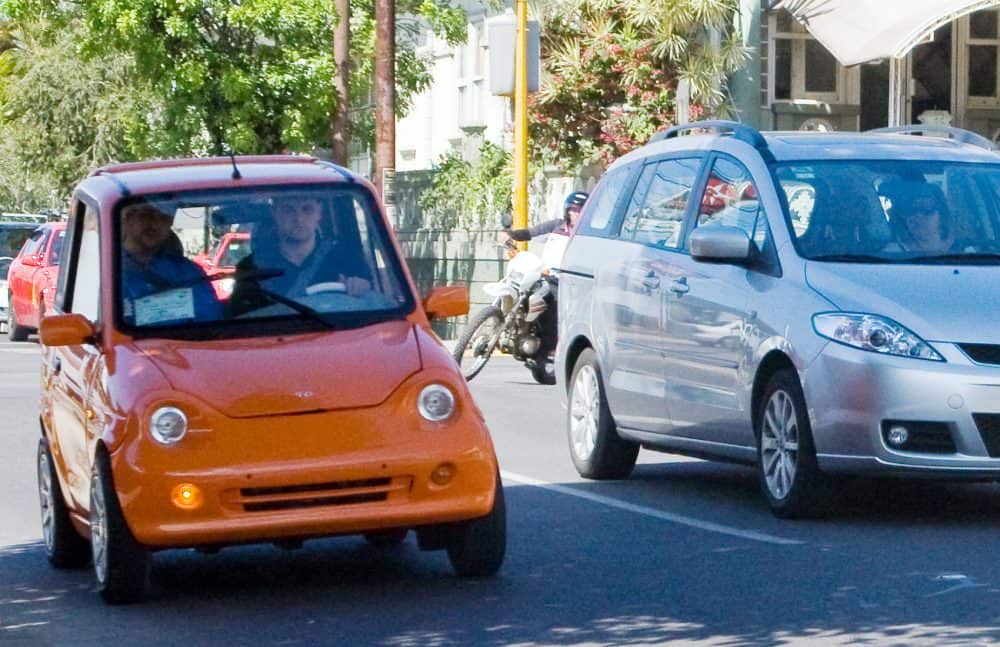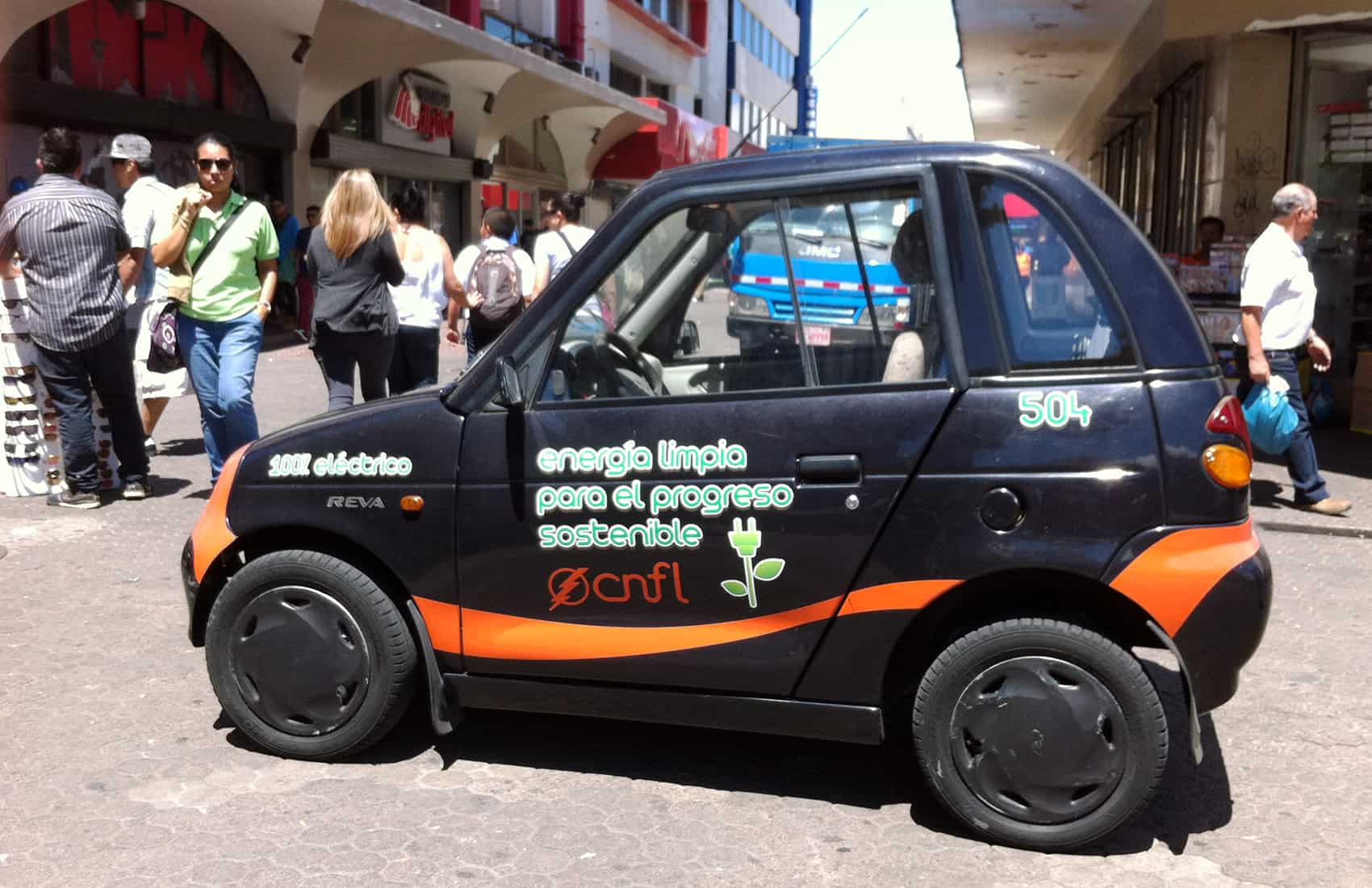Costa Rica ended 2015 with an impressive 98 percent of its electricity generated from renewable sources. But the country is still highly dependent on fossil fuel consumption for transportation.
Now the Legislative Assembly is evaluating a plan to boost the use of electric and hybrid cars that could start as soon as this year, according to the National Power and Light Company (CNFL), one of the public agencies involved in the proposal.
The CNFL’s director of electric transportation, Allan Blanco Coto, appeared last week before the Assembly’s Committee on Government Affairs and told lawmakers that actions to set up the appropriate infrastructure — mostly vehicle charging stations — are moving forward. The plan, which is still under development, is a joint effort among the Costa Rican Electricity Institute (ICE), CNFL and other electricity distribution companies, and has support from a group of private companies interested in building charging stations for electric cars throughout the country.
It is also supported by the Environment Ministry (MINAE) and the National Insurance Institute.
“Our estimations are that electric and hybrid car dealers could start operating here as soon as August,” Blanco told lawmakers.
Blanco’s appearance at the Assembly was part of a series of hearings on a bill that seeks to promote electric transportation. The bill was drafted and submitted by lawmakers Franklin Corella and Marcela Guerrero of the ruling Citizen Action Party (PAC). They hope to get its approval in the committee and the full Assembly before the end of the extraordinary period of sessions on April 30.
The initiative proposes a five-year period following the bill’s approval for promoting the development of electric transportation and facilitating a progressive substitution of the country’s fossil fuel-burning vehicles for electric or hybrid ones.
All government agencies during that period would be required to replace at least 10 percent of their vehicles with electric or hybrid ones, according to the proposal.
There are currently just over 2 million vehicles in Costa Rica, according to figures from the National Registry, for a population of some 5 million. More than 90 percent of the country’s vehicles run on fossil fuels — 75 percent on gas, 19 percent on diesel.
Hybrid and electric vehicles represent just over 1 percent of all vehicles in the country, while another 5.5 percent run on other, alternative fuels, such as kerosene and hydrogen.
The average age of vehicles here is 16 years, according to RITEVE SyC, the private company in charge of mandatory yearly technical inspections.
Incentives
One of the main goals of the electric vehicle bill is to curb a major detractor for the use of electric and hybrid cars here: their high prices. The bill proposes a series of tax incentives for promoting the purchase of these cars, including the elimination of the sales, selective consumption and customs taxes.
Hybrid and electric car owners would also be exempt from having to pay the vehicle circulation fee, or marchamo, during the first five years of the car’s use and they could park for free in metered parking spaces. The bill would also provide for a tax exemption for spare parts for hybrid and electric cars.
The bill also proposes waving for these car owners the restriction that prohibits vehicles from entering downtown San José on certain days according to their license plate number.
If approved, the law would ask public and private parking lots to have preferential spaces for hybrid and electric vehicles and the government should be required to implement, when possible, exclusive lanes on highways for them.
Another article of the bill proposes that all new private parking lots and shopping centers built after the adoption of the law be required to include a certain number of charging stations proportional to their parking capacity. Existing parking lots and businesses would be required to comply with the measure when they submit requests to renew their business licenses.
Importantly, the bill also outlines measures to promote the implementation of electric vehicles for public transportation, including buses, taxis and trains.
The bill’s approval would be the next step in an ongoing strategy to reduce the ecological footprint of the country’s vehicles. The effort started in 2014 when the government approved the Acquisition Program of Efficient Vehicles (PAVE), a credit line at the state-owned Bank of Costa Rica (BCR) geared towards incentivizing owners to replace their polluting vehicles.
The program offers 100 percent financing for owners who agree to exchange their vehicles, and 80 percent for those who decide to keep them and buy an additional, efficient one.
According to a BCR report last week, the bank has financed some 468 cars under PAVE, hardly a staggering number.

Reducing emissions
The draft bill being considered by the Assembly states that its main goal is for the country “to reduce its high dependency on fossil fuels, as well as reduce environmental pollution, damage to public health and transportation costs for citizens.”
Vehicles are responsible for two-thirds of oil consumption in Costa Rica and 34 percent of the country’s total carbon dioxide emissions, according to the Environment Ministry.
Vehicle pollution is most severe in the Greater Metropolitan Area (GAM), including San José and parts of Alajuela, Heredia and Cartago. Though just 4 percent of the nation’s territory, 75 percent of the country’s vehicles are in the GAM.
A 2011 World Bank study on the impact of air pollution on health care costs found that Costa Rica’s health system spent ₡210 billion ($387 million) annually on care for patients affected by pollution-related diseases.
Discussions on the electric and hybrid vehicle bill will resume next week in committee before the bill is brought for discussion and a vote by the full Assembly.






